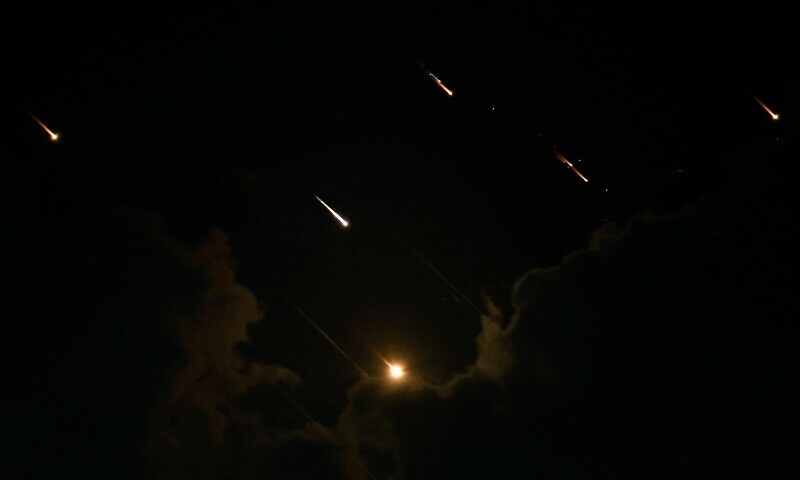
[ad_1]

Iran fired a salvo of ballistic missiles at Israel on Tuesday in retaliation to the latter’s campaign against Tehran’s Hezbollah allies in Lebanon and the killing of its chief and that of Hamas.
Alarms sounded across Israel and explosions could be heard in Jerusalem and the Jordan River valley after Israelis piled into bomb shelters. Reporters on state television lay flat on the ground during live broadcasts.
Reuters journalists saw missiles intercepted in the airspace of neighbouring Jordan. Israeli media reports said as many as 100 missiles had been launched.
After a roughly one-hour period, the Israeli military said the missile attack was over and people could leave air raid shelters.
“Following the situational assessment, it was decided that it is now permitted to leave protected spaces in all areas across the country,” it said in a statement.
Emergency services said at least two people sustained light injuries during the missile attack.
“Currently, there are no reports of injuries from the fire towards Israel, except for two light injuries from shrapnel in the Tel Aviv area and some minor injuries nationwide while moving to safe spaces,” a Magen David Adom emergency service statement said.
Iran’s Revolutionary Guards said the missile attack was in response to the killing of Hezbollah chief Hassan Nasrallah last week as well as that of Hamas leader Ismail Haniyeh.
“In response to the martyrdom of [Hamas leader] Ismail Haniyeh, Hassan Nasrallah and [Guards commander] Nilforoshan, we targeted the heart of the occupied territories (Israel),” the Guards said in a statement reported by the Fars news agency.
The Guards threatened to carry out “crushing attacks” against regional Israel if it retaliated after the missile attack.
“If the Zionist regime reacts to Iranian operations, it will face crushing attacks,” the Guard said.
Iran’s Supreme Leader Ayatollah Ali Khamenei gave the order to launch missiles at Israel, a senior Iranian official told Reuters, adding that Tehran “is fully ready for any retaliation”
Iran’s mission to the United Nations in New York posted on X that the attack on Israel is a “legal, rational, and legitimate response to the terrorist acts.”
“Should the Zionist regime dare to respond or commit further acts of malevolence, a subsequent and crushing response will ensue. Regional states and the Zionists’ supporters are advised to part ways with the regime,” the mission wrote.
Air traffic was halted at Israel’s Ben Gurion airport, a spokesman said. “There are currently no takeoffs and landings,” said a spokesman for Israel’s main international airport.
Earlier, the military had announced that any ballistic missile strike from Iran was expected to be widespread and told the public to shelter in safe rooms in the event of an attack.
Iran has vowed to retaliate following attacks that killed the top leadership of its Hezbollah allies in Lebanon.
The firing of missiles came after Israel said its troops had launched ground raids into Lebanon, though it described the forays as limited. The Israeli campaign in Lebanon is the biggest escalation of regional warfare since fighting erupted in Gaza a year ago.
In Washington, US President Joe Biden said the United States was prepared to help Israel defend itself from Iranian missile attacks.
“We discussed how the United States is prepared to help Israel defend against these attacks, and protect American personnel in the region,” Biden said on X about a meeting held with Vice President Kamala Harris and the White House national security team earlier in the day.
Biden directed the US military to aid Israel’s defence and shoot down missiles targeting Israel, the White House National Security Council (NSC) said.
Biden and US Vice President Kamala Harris are monitoring the attack from the White House situation room and receiving regular updates, NSC spokesperson Sean Savett said in a post on X.
The Iranian missile launches came after Israeli ground troops launched raids into Lebanon and its warplanes bombed from the skies.
United Nations Secretary-General Antonio Guterres condemned the “broadening of the Middle East conflict, with escalation after escalation” after Iran fired the salvo of ballistic missiles.
“This must stop. We absolutely need a ceasefire,” Guterres said in a statement.
Tonight’s attack was Iran’s second on Israel after a missile and drone attack in April in retaliation for a deadly Israeli air strike on the Iranian consulate in Damascus.
Nearly all the munitions fired in that attack were intercepted by Israel or its allies.






